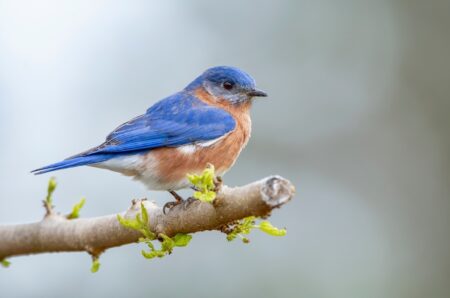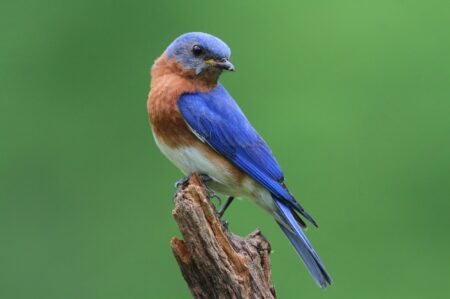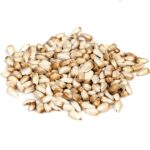What Do Bluebirds Eat?
Bluebirds are small, colorful birds that are commonly found in North and Central America. They are known for their bright blue feathers on their backs, wings, and tails, along with their rusty-colored breasts. Bluebirds are insectivores, meaning they primarily feed on insects, but they also have a varied diet and may eat a variety of other foods.
In this article, we will delve into the different types of foods that bluebirds eat, including insects, fruits, seeds nuts, and more. We will also discuss how bluebirds forage for food and how humans can attract bluebirds to their yards by providing the right types of food.
What Do Bluebirds Eat?
Bluebirds primarily eat insects, including beetles, caterpillars, grasshoppers, and crickets. They also eat small snails, earthworms, and spiders. In addition, they may also eat fruits, berries, and seeds, especially during the winter when insects are less abundant. Bluebirds are known to visit bird feeders for suet, mealworms, chopped peanuts, and other similar foods.
What Do Baby Bluebirds Eat?
Baby bluebirds primarily eat insects and other invertebrates, such as caterpillars, beetles, crickets, earthworms, and spiders. They also consume fruit and berries as they grow older. The diet of baby bluebirds is essential for their rapid growth and development, as well as for building their immune system. The high protein content in insects helps the chicks develop healthy muscles, feathers, and bones. Insects are also rich in essential vitamins and minerals, necessary for their proper growth and survival. Bluebirds are not picky eaters, and they will consume a wide variety of insects depending on what is available in their habitat. The parents provide the chicks with a steady supply of food, regurgitating it into their mouths until they are old enough to leave the nest and forage for food themselves.
What Do Bluebirds Eat at Feeders?
Bluebirds are songbirds native to North America and they primarily feed on insects and fruits. However, they will also visit bird feeders to supplement their diet, especially during the winter months.
- Insects: Bluebirds are insectivorous birds, meaning they primarily feed on insects. Their diet consists of various insects such as beetles, grasshoppers, crickets, caterpillars, and spiders. Insects provide essential protein and fat for bluebirds, especially during breeding season when they need to nourish their young. Bluebirds are also known to hunt insects on the ground and in the air.
- Fruits: Bluebirds also eat fruits, particularly during the colder seasons when insects are scarce. They enjoy a variety of fruits such as berries, raisins, grapes, and apples. They may also consume fruits that are starting to rot, which are a good source of nutrients for them.
- Mealworms: Bluebirds are attracted to feeder stations that offer mealworms. These small, white grubs are high in protein and fat, making them a nutritious snack for bluebirds. They can be offered live, dried, or freeze-dried and can be found at most pet or bird supply stores.
- Suet: Suet is another high-energy food source that bluebirds enjoy, especially during colder months. Suet is a mix of animal fat and bird seed, and it can be placed in special suet feeders or offered in small chunks on a platform feeder.
- Sunflower seeds: Bluebirds will also eat sunflower seeds, which are a common food found in many bird feeders. However, they prefer sunflower chips or hulled sunflower seeds, as they are easier for them to eat without the hassle of removing the hull.
It is important to note that bluebirds are cavity nesters, and they have a unique feeding behavior. They do not take food directly from feeders, but instead, they perch nearby and scan the ground for food. They swoop down to grab insects or fruits and then return to their perch to eat. Therefore, it is necessary to provide them with a feeder that has a nearby perch or a platform feeder that they can easily access.
SEE ALSO: How To Get Bird Out of Chimney: Step-by-Step Guide
What Do Bluebirds Eat in The Winter?
In the winter, bluebirds typically eat insects, fruits, and berries. They may also eat small seeds if necessary. Some popular foods for bluebirds in the winter include mealworms, suet, sunflower hearts, raisins, and various types of berry bushes such as holly, juniper, and serviceberry. Providing a constant supply of food and water can help attract and sustain bluebirds during the winter months.
What Kind of Food Attracts Bluebirds?
Bluebirds are primarily insectivorous, meaning they primarily eat insects. However, they will also eat fruits and berries, especially during the winter months when insects are scarce. Some specific types of food that attract bluebirds include:
- Mealworms: These are a favorite of bluebirds and can be easily purchased from pet stores or online. They are high in protein and provide essential nutrients for the birds.
- Berries: Bluebirds particularly like berries that are high in sugar, such as elderberries, blackberries, and blueberries. These can be placed in a hanging feeder or scattered on the ground for the birds to find.
- Suet: Suet is a high-fat food made from rendered beef or pork fat. Bluebirds will often eat suet, especially during the winter when other food sources are scarce.
- Insects: Bluebirds will eat a variety of insects, including grasshoppers, crickets, caterpillars, and beetles. You can attract insects to your yard by planting native plants and avoiding the use of pesticides.
- Mealworm feeders: These feeders are designed specifically for bluebirds and can be filled with mealworms, suet, or other insects to attract the birds. They usually have a small dish or platform for the birds to stand on while they eat.
- Live food: Bluebirds are also attracted to live food, such as worms, grubs, and caterpillars. You can create a small compost pile in your yard to attract these insects or leave leaf litter and fallen fruit for the birds to forage in.
- Water: Providing a source of clean, fresh water can also attract bluebirds to your yard. They will drink from shallow birdbaths or small dishes of water, and it can also help them stay hydrated during hot summer days.
Remember to avoid using any chemical pesticides or insecticides in your yard, as these can be harmful to bluebirds and other birds that may be eating the insects. Providing a variety of food sources throughout the year will help attract bluebirds and keep them coming back to your yard.
How to Attract Bluebirds With a Tuna Can And A Nail
- Gather your materials: You will need an empty tuna can, a nail, and a wooden post or tree branch.
- Using the nail, poke several holes around the edges of the tuna can, about 1 inch apart.
- Place the tuna can on the wooden post or tree branch, with the holes facing outward.
- Fill the tuna can with mealworms or other small insects that bluebirds love to eat.
- Hang or mount the post or branch in a visible area, such as in your backyard or near a bird feeder.
- Keep the tuna can filled with mealworms and clean it out regularly to prevent mold or bacteria buildup.
- Bluebirds are territorial birds, so it may take some time for them to discover the mealworms in the tuna can. Be patient and keep the can stocked with fresh mealworms to attract them.
- Once the bluebirds have found the tuna can, they will likely return regularly to feed on the mealworms. You can also add a small amount of water to the can to keep the mealworms hydrated and more appealing to the birds.
How Do Bluebirds Hunt Prey?
Bluebirds are known to be primarily insectivorous, meaning they mainly eat insects for their diet. They are skilled hunters and have several techniques for catching their prey.
- Perching and Pouncing: One of the most common hunting methods for bluebirds is perching on a high vantage point, such as a branch or fence, and then pouncing on their prey when they spot it moving on the ground.
- Hovering: Bluebirds also have the ability to hover in mid-air, a behavior often seen in hummingbirds. They use this technique to catch flying insects like mosquitoes and flies.
- Darting: Bluebirds can make quick and sudden dives to catch insects on the ground or in low bushes.
- Foraging: Bluebirds also forage on the ground, flipping through leaves and debris to find insects hiding underneath. They may also hunt for insects in trees and shrubs.
- Group Hunting: Bluebirds are social birds and may hunt in groups, especially during breeding season. This allows them to corner and catch larger prey, such as grasshoppers or beetles.
Once the bluebird has caught its prey, it will use its sharp, curved bill to kill and crush it before swallowing it whole. Bluebirds may also store extra food in crevices or nest boxes to save for later. Cats and other predators pose a threat to bluebirds, so they are constantly on the lookout for any potential danger while hunting.
FAQs
Q. What is the best thing to feed bluebirds?
A. The best thing to feed bluebirds is a variety of insects like mealworms, crickets, and grasshoppers, as well as fruits like berries and chopped apples. They also enjoy suet and certain types of birdseed, such as sunflower chips and millet.
Q. Do bluebirds eat seeds?
A. Bluebirds primarily eat insects and fruits, but they may occasionally eat small seeds, such as those found in wild berries.
Q. Do bluebirds eat mice?
A. No, bluebirds do not typically eat mice. They are insectivorous birds and primarily feed on insects, fruits, and seeds. They may occasionally eat small invertebrates such as snails or caterpillars, but mice are not a part of their regular diet.
Q. Do bluebirds eat corn?
A. Bluebirds typically do not eat corn as it is not a part of their natural diet. They primarily feed on insects, berries, and fruits.
Q. Do bluebirds eat dried mealworms?
A. Yes, bluebirds can eat dried mealworms as part of their diet. These protein-rich food sources can be a good supplemental snack for bluebirds, especially during the winter months when natural food sources may be scarce.
SEE ALSO: How to Get Rid of Birds Nest: The Ultimate Guide
Conclusion
Bluebirds primarily eat insects, fruits, and berries. They will also consume seeds, especially during the winter months. It is important to provide a varied diet for bluebirds, including mealworms, suet, and fresh fruit, to ensure that they are getting all the nutrients they need. Providing a clean, fresh water source is also important for bluebirds. By taking care of their food and water needs, you can help attract and support these beautiful birds in your backyard.


